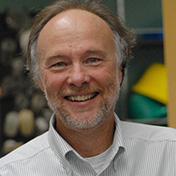
Douglas C Rees, PhD
The research interests of the Rees group have emphasized the structures and mechanisms of complex metalloproteins and integral membrane proteins, particularly those involved in ATP-dependent transduction processes. The metalloprotein work defined the unusual structures of the nitrogenase FeMo-cofactor and the more widespread Mo-cofactor that participate in basic reactions of the biological nitrogen and sulfur cycles, while the membrane protein studies have addressed energy transduction processes associated with photosynthesis, mechanosensation and transport. The current work on membrane proteins centers on bacterial mechanosensitive channels and ATP dependent bacterial transporters mediating the high-affinity uptake of transition metals and nutrients.
 Douglas C Rees received his BS in Molecular Biophysics and Biochemistry from Yale College in 1974 working with Carolyn Slayman, and his PhD in Biophysics from Harvard University (1980), where he conducted his graduate research in protein crystallography with William Lipscomb, working on carboxypeptidase A. Following a postdoctoral appointment at the University of Minnesota studying nitrogenase with James B Howard, he joined the faculty of the Department of Chemistry and Biochemistry at UCLA in 1982 until moving to Caltech in 1989. He is a member of the American Academy of Arts and Sciences and the National Academy of Sciences, and was a Vallee Visiting Professor at Oxford in 2005.
Douglas C Rees received his BS in Molecular Biophysics and Biochemistry from Yale College in 1974 working with Carolyn Slayman, and his PhD in Biophysics from Harvard University (1980), where he conducted his graduate research in protein crystallography with William Lipscomb, working on carboxypeptidase A. Following a postdoctoral appointment at the University of Minnesota studying nitrogenase with James B Howard, he joined the faculty of the Department of Chemistry and Biochemistry at UCLA in 1982 until moving to Caltech in 1989. He is a member of the American Academy of Arts and Sciences and the National Academy of Sciences, and was a Vallee Visiting Professor at Oxford in 2005.